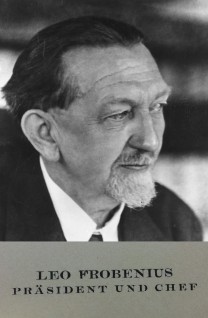Leo Frobenius was born in Berlin in 1873.
Due to his father's occupation as a fortification architect/builder his family moved constantly, and Frobenius did not attend school regularly. For this reason he could not take up his studies at a university but became an autodidact. After developing an early interest in foreign cultures and anthropology (his grandfather was director of the Berlin Zoological Garden, where - as a child - he was deeply impressed by Africans performing at the ethnological expositions/"human zoo"), Frobenius read the works of Friedrich Ratzel and Adolf Bastian.
After his PhD thesis was rejected, Frobenius did an apprenticeship in order to become a merchant. Moreover, he worked at the Ethnological Museum Berlin (formerly: Staatliches Museum für Völkerkunde) in Berlin between 1894 and 1898.
Between 1904 and 1935 Frobenius did twelve research trips to Africa, where he also collected a large number of ethnographic objects. His early journeys not only where supported by anthropological museums and representatives of the German economy but even by the German Kaiser. In later years, Frobenius also collected myths and indigenous narratives and developed an interest in cave painting.
His Archive of African Cultures moved from Berlin to Munich in 1920 and eventually became the Institute for Cultural Morphology (Institut für Kulturmorphologie). In 1925 Frobenius and the institute moved to Frankfurt/Main, where he took up a professorship at the university in 1932. Moreover, Frobenius became director of the newly founded Anthropological Museum (today: Museum for the Cultures of the World) in Frankfurt in 1934. In 1938he founded the anthropological journal Paideuma.
Though being criticized by scientists for his non-systematic and rather romantic approach to anthropology, Frobenius had a remarkable personality and was able to generate a strong public interest in Africa. He not only pointed out the magnificence of African cultures but also emphasized their historic dimension, an unusual position for his time.
His concept of cultural morphology assumed that cultures could be perceived like living organisms and therefore go through different stages of life. Even though this approach is outdated, it has had some impact on the tradition of German Anthropology.
Leo Frobenius died in Biganzolo, Italy, in 1938.
(This text based on the »Ethnologenverzeichnis«, by courtesy of Weißensee-Verlag and Sibylle Alsayad; photgraphy by courtesy of Frobenius-Institute)



